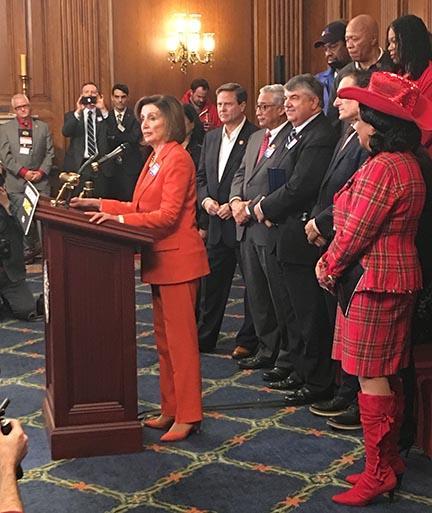AFL-CIO President Richard Trumka called it “the most significant step Congress has taken to strengthen labor laws in the United States in 85 years and a win for workers everywhere.”
The U.S. House of Representatives on Feb. 6 passed the Protecting the Right to Organize Act (HR 2474), with bipartisan support. The final tally was 224 in favor and 194 against.

House Speaker Nancy Pelosi (D-California) promotes the PRO Act during a Capitol Hill press conference Feb. 5. Behind her are (from left) U.S. Rep. Donald Norcross (D-New Jersey), U.S. Rep. Bobby Scott (D-Virginia), AFL-CIO President Richard Trumka, U.S. Rep. Andy Levin (D-Michigan) and U.S. Rep. Frederica Wilson (DFlorida). The congressional representatives all belonged to unions.
Also known as the PRO Act, the bill would change some of the nation’s labor laws by penalizing companies that retaliate against workers who try to organize. The bill aims to strengthen collective bargaining rights, and to weaken state-enacted right-to-work (for less) laws.
For example, there are currently no penalties on employers and no compensation for a worker when an employee is fired or faces retaliation for trying to organize a union. As passed, the PRO Act would call for fines for violations of the National Labor Relations Act. It would require the National Labor Relations Board (NLRB) to go to court for an injunction to reinstate workers if the NLRB believes they illegally have been retaliated against for union activities.
The PRO Act also establishes a timely process for gaining a first contract – including mediation and, if needed, binding arbitration. The bill would permit unions and employers to reach a “fair share” clause requiring all workers covered by a collectively bargained contract to contribute towards the cost of bargaining and administering the agreement in all 50 states.
Among its reforms, the PRO Act would repeal the section of the Taft-Hartley Act that permits states to enact so-called right-to-work laws. It also would outlaw “captive audience” meetings where bosses can force workers to listen to anti-union presentations, often from outside consultants (better known as union-busters).
The bill will also tighten the definitions of independent contractor and supervisor, making sure that eligible workers can organize if they so choose. The legislation would prohibit employers from permanently replacing strikers.
At a press conference in the U.S. Capitol on Feb. 5 conducted by Speaker Nancy Pelosi, Trumka let others know the importance of the bill: “Those who would oppose, delay or derail this legislation, do not ask us – do not ask the labor movement – for a dollar or a door knock! We won’t be coming!” he said.
Pelosi said, “I am so proud to stand here with Richard Trumka, the president of the AFL-CIO; Chris Shelton, president of Communication Workers of America; Jennifer Dorning, president of Department for Professional Employees of the AFL-CIO; John Samuelson, president, Transport Workers Union; Jim Slevin, president, Utilities Workers Union of America; Tim Driscoll, president, International Union for Bricklayers and Allied Craftworkers; and representatives of many other unions who are here with us today.”
Also speaking at the press conference were House Education and Labor Committee Chairman Bobby Scott (D-Virginia), U.S. Rep. Frederica Wilson (D-Florida), U.S. Rep. Donald Norcross (D-New Jersey), U.S. Rep. Pramila Jayapal (D-Washington) and U.S. Rep. Andy Levin (D-Michigan).
“We all want to talk about a seat at the table,” Pelosi said. “The most important table to us is America’s kitchen tables, where families come together to make decisions about their families. And we don’t want them to have to struggle unnecessarily, when there is an opportunity for them to do better. And I want to thank the AFLCIO and all in the labor movement for what they have done to make the future better for so many families in America.”
She added, “This is so important to America. It’s so important to our economy. Nothing is more important to our economy than the education of our children and also to have purchasing power on the part of the middle class. That can only happen when workers get respected for the work that they do and receive the wages and salaries that they deserve. And so, the PRO Act is a vehicle in that direction.”
“I know how important it is to give workers a voice and protect them from unfair labor practices because I lived it,” said Norcross, a former business agent for the IBEW Local 351 and president of the Southern New Jersey AFL-CIO. “I fought for New Jerseyans at the negotiating table for decades. Workers win when they can band together and collectively bargain for safer workplaces, higher wages and better benefits. Today, my colleagues and I took a major leap forward in restoring fairness to an economy that’s rigged against workers. I urge the Senate to act swiftly and pass the PRO Act to level the playing field for American workers and their families.”
Levin, vice chairman of the House Education and Labor Committee, made the following remarks on the House Floor after voting in favor of the bill: “I have spent most of my career helping workers form unions and bargain collectively. The power of workers to unite and demand fair wages, better benefits, and safer working conditions is truly inspiring, and it’s essential for working families simply trying to get by. Right now, corporate profits are skyrocketing while the share of health care costs paid by employers is falling. Worker productivity is at its peak, yet wages are stagnant. The gap between the rich and the poor is the highest ever recorded. It should be no surprise that while all this is happening, union membership is at its lowest point in decades. The PRO Act is about reversing these trends so workers can enjoy their fair share in the economy that they help create. Recent studies have shown that in cities where union membership is strong, children in low-income families go on to ascend to higher income levels than their parents. Isn’t that what every parent wants? Creating a pathway to a better life – that is the American dream, and that is the power of a union.
“The PRO Act is about that most American of ideals: freedom,” he continued. “All we are doing today is allowing workers to decide on their own, free of harassment and intimidation, whether or not they wish to form a union and bargain collectively, and to access their other rights under the NLRA. When we pass the PRO Act today, we say loud and clear that we are not on the side of the special interests. We stand proudly on the side of working families.”
In a press release, Trumka (a longtime friend of SEATU) said, “I applaud the U.S. House for passing the PRO Act. America’s labor laws are no longer an effective means for working people to have our voices heard. The long-overdue PRO Act will provide significant protections for workers exercising our legal right to form a union, a right that’s been trampled on for decades by union-busting consultants and antiworker politicians.”
He recently pointed out that unions are now more popular than ever, saying, “A Gallup poll found that 64 percent of Americans approve of unions and research from MIT shows nearly half of non-union workers – more than 60 million people – would vote to join today if given the opportunity. Twenty-five years ago, only one-third of workers said the same thing. What explains the gap between desire for union representation and existing union representation? Simply put, unscrupulous employers and outdated labor laws have created an environment where it has never been harder to form a union.”
He continued, “Despite the unrelenting attacks, 2019 was a year of undeniable progress in the labor movement. Nearly 50,000 UAW members at General Motors fought on the picket line for 40 days over better pay and benefits. Thousands of public-school teachers – proud AFT members – went on strike across the country to demand smaller class sizes, higher wages and better conditions for their students. Thousands more media workers, sick of layoffs and budget cuts, unionized through voluntary recognition. Now these workers are demanding changes in our labor law.
“In short, unions are good for our economy and our society. With the PRO Act, lawmakers can finally make the life-changing promise of a union available to all those who want it. It’s time,” Trumka said.
With the bill’s passage in the House, the PRO Act heads to the U.S. Senate for consideration. The Washington Post reports the chair of the Senate Health, Education, Labor and Pensions Committee, Lamar Alexander (R-Tennessee), has said the measure will not be considered this year. Despite this stoppage, the passage of the bill in the House is a crucial first step on a road to becoming law, one that will continue beyond this important upcoming election year.
# # #

